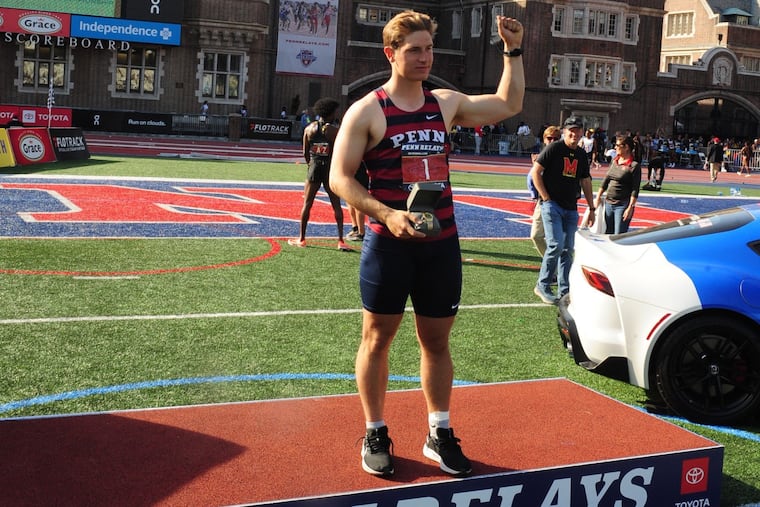Hard work helped Marc Minichello capture the NCAA javelin championship: ‘None of this happened on accident’
Minichello’s third throw eventually earned the title at Oregon’s Hayward Field. He threw 81.17m (266 feet, 3 inches) and crossed the 80m threshold twice, breaking Penn and Ivy League records.

Everything Marc Minichello does is calculated and measured.
When Penn hired a new javelin coach in August 2021, the senior did his due diligence. He researched Fletcher Brooks’ background, then set up an introductory meeting. One teammate jokingly told Brooks that Minichello loves meetings because he’s in Penn’s Wharton School of Business.
Minichello showed Brooks around the Philadelphia campus, where they eventually made their way to two seats in the grandstands of Franklin Field. Overlooking the 127-year-old track, they talked strategy, bouncing ideas back and forth.
“He was very interested in getting to know me right off the bat and getting to know my philosophy,” Brooks said. “He was asking questions that I couldn’t even answer at the time, but he clearly showed he was very interested in his future.”
On June 8, Minichello became the second Quaker ever to win the NCAA men’s javelin championship. An 81.17-meter throw (266 feet, 3 inches) broke the program and Ivy League records and eventually secured the title at the University of Oregon’s Hayward Field in Eugene.
While it wasn’t the farthest toss in championship history (the record of 89.62 meters was set in 1984), Brooks said the group may have been one of the most competitive fields. Second- through fifth-place finishers each threw within a meter of one another.
» READ MORE: Top high school milers Gary Martin and Colin Sahlman will race in the 800 meters. Why not the mile?
Each participant received three preliminary throws, and the top nine advanced to the finals for three more. It was Minichello’s third throw that earned him the title. He knew the distance had the potential but walked off the runway with an unsatisfied, deadpan nod.
“Unfortunately, I don’t think I’m the most pleasant person to compete with,” he said. “I think at that time, after the third throw, I was in a similar head space as Kobe Bryant in that one press interview when he said, ‘Why would I be happy? The job’s not finished.’ There was still a whole half of the competition left.”
Nobody else in the field eclipsed 80 meters. Minichello did it twice, as he also threw 81.05 meters on his fifth attempt. Finishing second, right behind him, was Virginia’s Ethan Dabbs, from Johnstown, Pa. The two took their official visits to Penn together in 2018 and nearly both became Quakers.
Minichello wasn’t the most sought recruit because of his 5-foot-9, 185-pound stature. But he was pursuing Power 5 programs like Duke, Virginia, Wake Forest, and North Carolina.
Wyoming (Pa.) Area High School track coach and athletic director Joe Pizano helped sway his decision with a simple question: “What happens if track is not an option? If you happen to get injured or weren’t able to do the track or athletic piece, then where would you be most happy?”
Minichello said Penn jumped to the forefront of his recruitment once he started thinking about the next 40 years of his life, not the next four.
Those four years were spent dedicating himself to his craft. Brooks says Minichello has become the program’s benchmark for what it takes to be successful. He gets to practice two hours early and is often the last one to leave.
That dedication manifested before Minichello’s championship meet, which had a 5:45 p.m. start. Minichello was expecting to compete around 7 p.m. In preparation, he started adjusting his East Coast sleeping schedule to match that of the West Coast time zone.
Minichello has always shown with a chip on his shoulder once the competition starts. People have long criticized his size and the mid-major school name on his chest. It has all strengthened his mental approach.
» READ MORE: Mo’ne Davis’ journey shows how far sports have progressed — and how far they still need to go
From Minichello’s senior season in high school, his personal best climbed about 9 meters (29.5 feet). Former Penn throwing coach Jeff Pflaumbaum laid his foundation for three seasons. Brooks’ expertise in running and jumping during his approach helped propel him to national champion status.
“[Pflaumbaum] told me, ‘You’re going to be successful anywhere based on you. Us as coaches can only take you so far,’” Minichello said. “There were things that Coach Brooks did very well, so I tried to take as many of those things as I could and implement them to what I already knew from coaches in the past.”
After capturing the NCAA title, Minichello sprawled out on the infield turf with his coach towering over him.
Brooks said he hunched down and told Minichello, “You’re one of the best competitors I’ve ever coached.” He admitted to leaving out an expletive or two in retelling that story.
The Ivy League rule barring athletes from competing as graduate students means Minichello’s time as a Quaker has nearly run its course. He’ll spend his final two years of eligibility as a grad transfer at Georgia competing in the javelin and pursuing a master’s degree in law to complement his bachelor’s degree in science and economics.
Then he has his eyes set on the 2024 Olympics.
“None of this happened on accident,” Minichello said. “Everything was extremely calculated and well prepared for. There were a lot of late nights at the facility, lonely days where I’d be the only one there. It’s something that I took pride in throughout the journey. Working harder than everyone I was next to.”